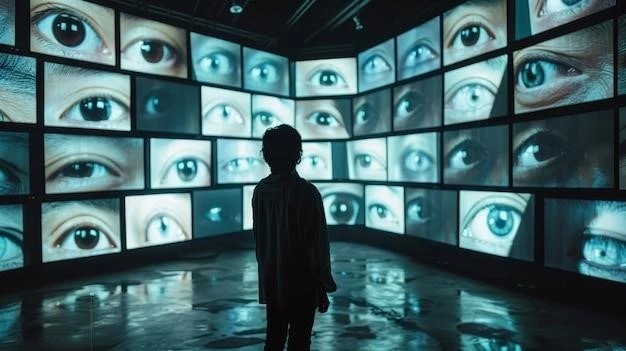The 21st century has witnessed an unprecedented expansion of technological capabilities‚ bringing with it profound implications for the relationship between governments and citizens. At the forefront of this evolution lies the issue of government surveillance and its impact on individual privacy. The proliferation of digital technologies‚ coupled with sophisticated data collection and analysis tools‚ has granted governments an unparalleled capacity to monitor and track individuals on a scale unimaginable just a few decades ago.
The Digital Panopticon: A New Era of Surveillance
The concept of the panopticon‚ a prison design envisioned by Jeremy Bentham in the 18th century‚ provides a chillingly relevant framework for understanding modern surveillance practices. Bentham’s panopticon featured a central tower surrounded by cells‚ allowing a single guard to potentially observe all inmates without them knowing whether they were being watched. This constant state of potential surveillance was intended to induce self-discipline and conformity.
In the digital age‚ the panopticon has taken on a virtual form. Our online activities‚ communications‚ and movements leave digital traces that can be collected‚ stored‚ and analyzed by governments. This data can be gleaned from a wide range of sources‚ including:
- Internet Service Providers (ISPs): Can track browsing history‚ online purchases‚ and communication metadata.
- Social Media Platforms: Collect vast amounts of personal data‚ including user interactions‚ interests‚ and social connections.
- Surveillance Cameras: Increasingly equipped with facial recognition technology‚ allowing for the tracking of individuals in public spaces.
- Mobile Devices: Function as mobile sensors‚ constantly transmitting location data‚ communication logs‚ and even health information.
The aggregation of this data creates comprehensive profiles of individuals‚ providing insights into their habits‚ beliefs‚ and associations. While proponents argue that such surveillance is necessary to combat terrorism and crime‚ critics warn of its potential for abuse and erosion of civil liberties.

Eroding Privacy: The Chilling Effect on Freedoms
The pervasive nature of government surveillance can have a chilling effect on fundamental freedoms‚ including:
- Freedom of Expression: The fear of being monitored can discourage individuals from expressing dissenting views or engaging in activities perceived as subversive.
- Freedom of Assembly: The ability to track individuals’ movements can deter participation in protests or gatherings deemed undesirable by the government.
- Freedom of the Press: Surveillance of journalists and their sources can undermine investigative journalism and impede the free flow of information.
The erosion of these freedoms can have a detrimental impact on democratic societies‚ fostering an environment of self-censorship and inhibiting open dialogue and dissent.

The Need for Transparency‚ Accountability‚ and Oversight
To mitigate the risks posed by government surveillance‚ it is crucial to establish robust frameworks for transparency‚ accountability‚ and oversight. These measures should include:
- Clear Legal Frameworks: Defining the limits of government surveillance powers and establishing clear guidelines for data collection‚ retention‚ and use.
- Independent Oversight Mechanisms: Establishing independent bodies responsible for scrutinizing surveillance practices and ensuring compliance with legal and ethical standards.
- Transparency and Public Disclosure: Regularly publishing information about surveillance activities‚ including the number of warrants issued‚ data intercepted‚ and individuals targeted.
- Whistleblower Protection: Enacting robust legal protections for individuals who expose illegal or unethical surveillance practices.
By implementing these measures‚ governments can strike a balance between security concerns and the protection of individual rights.
Striking a Delicate Balance: Navigating the Future of Privacy
The debate surrounding government surveillance and privacy is complex and multifaceted. While acknowledging the legitimate security concerns that governments face‚ it is crucial to safeguard the fundamental right to privacy. Striking a balance between these competing interests requires a nuanced approach that prioritizes transparency‚ accountability‚ and respect for individual liberties.
As technology continues to evolve at an unprecedented pace‚ it is imperative to engage in an ongoing dialogue about the ethical implications of government surveillance. By fostering a culture of respect for privacy and enacting robust safeguards‚ we can harness the power of technology while preserving the freedoms that define a democratic society.










